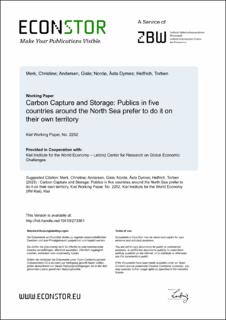Carbon capture and storage - Publics in five countries around the north sea prefer to do it on their own territory
Abstract
Carbon Capture and Storage (CCS) has been identified as an essential part of the lowest-cost path toward reaching the goals of the Paris Agreement. In Europe, an accelerated pace of CCS development indicates that a CO2 transport and storage system could be established by 2030. However, we know little about how the public views the market for transport and storage of CO2 currently under development in Europe. In early 2023, we conducted an experimental comparative survey to study public opinions on cross-border CO2 trade for storage in Denmark, Germany, the Netherlands, Norway and the UK. The share of respondents that perceive CCS as somewhat positive or very positive varies considerably between the countries; we find the highest share in Denmark (69%), followed by the UK (68%), Norway (67%), the Netherlands (57%) and the lowest share in Germany (49%). Especially concerns about environmental risks and costs lead to more negative views, while perceptions of job creation and economic opportunities lead to more positive evaluations. The experimental results show that importing CO2 for storage is among the least preferred options in all countries, while the storage of CO2 that has been captured in the own country is the most preferred option; the gap in the share of positive evaluations is substantial and amounts to up to 20 percentage points in the UK. Respondents who feel that countries are responsible for reducing national greenhouse gas emissions and storing their own captured CO2 drive the pattern of a more positive evaluation of a domestic CCS value chain and a more negative evaluation of importing CO2. Carbon capture and storage - Publics in five countries around the north sea prefer to do it on their own territory
